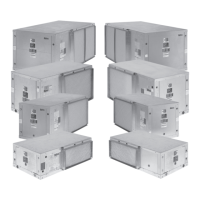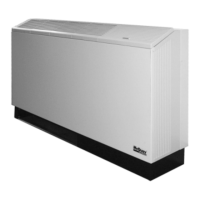IM 778 / Page 5
Electrical Data
1. Verify the compatibility between the voltage and phase
of the available power and that shown on the unit serial
plate. Line and low voltage wiring must comply with local
codes or the National Electrical Code, whichever
applies.
2. Apply correct line voltage to the unit. A
7
⁄8" (22mm) hole
and/or a 1
1
⁄8" (29 mm) knockout is supplied on the side
of the unit. A disconnect switch near the unit is required
by code. Power to the unit must be sized correctly and
have dual element (Class RK5) fuses or an HACR circuit
General
breaker for branch circuit overcurrent protection. See the
nameplate for correct ratings.
3. Three phase 50 cycle units, 380/50/3, require a neutral
wire for 230/50/1 power to the fan circuit.
4. Connect the thermostat/subbase wiring with the power
“off ” to the unit.
5. Field supplied relays installed on the input terminals
W1, W2, Y1, Y2 or G may introduce electrical noise.
Never install relay coils in series with the inputs.
230 Volt Operation
Fan Assembly
All 208-230 volt single-phase and three-phase units are fac-
tory wired for 208 volt operation. For 230 phase operation,
the line voltage tap on the 24 volt transformer must be
All fan motors are multi-speed, PSC type with integral
mounting brackets and thermal overload protection. The
motor is isolated from the fan housing for minimum vibra-
tion transmission. Fan motors have a terminal strip on the
motor body for simple motor speed change without going
back to the control box. All the fan/motor assemblies have
a removable orifice ring on the housing to accommodate
changed. Disconnect and cap the red lead wire and inter-
change it with the orange lead wire on the primary of the 24
volt transformer.
Piping
1. All units should be connected to supply and return pip-
ing in a two-pipe reverse return configuration. A
reverse return system is inherently self-balancing and
requires only trim balancing where multiple quantities
of units with different flow and pressure drop charac-
teristics exist in the same loop. Check for proper water
balance by measuring differential temperature reading
across the water connections. For proper water flow,
the differential flow should be 10°F to 14°F (5°C to 8°C)
for units in cooling mode.
A direct return system may also work acceptably,
but proper water flow balancing is more difficult to
achieve and maintain.
2. The piping can be steel, copper or PVC.
3. Supply and return runouts usually join the unit via short
lengths of high pressure flexible hose which are sound
attenuators for both unit operating noise and hydraulic
pumping noise. One end of the hose should have a
swivel fitting to facilitate removal for service. Hard pip-
ing also can be brought directly to the unit. This option
is not recommended since no vibration or noise atten-
uation can be accomplished. The hard piping must
have unions to facilitate unit removal. See Figures 8, 9,
and 10 for typical piping setup.
4. Some flexible hose threaded fittings are supplied with
sealant compound. If not, apply Teflon tape for a tight
seal.
5. Supply and return shutoff valves are required at each
conditioner. The return valve is used for balancing and
should have a “memory stop” so that it can always be
closed off but can only be reopened to the proper posi-
tion for the flow required.
6. Do not connect any unit to the supply and return pip-
ing until the water system has been cleaned and
flushed completely. After the cleaning and flushing has
taken place, the initial connection should have all
valves wide open in preparation for water system flush-
ing.
7. Condensate piping can be steel, copper or PVC. Each
unit includes a condensate connection.
8. Units are internally trapped.
motor and fan wheel removal without disconnecting the
ductwork. The fan housing protrudes through the cabinet
allowing adequate material for connection of flexible duct.
Each model unit is shipped from the factory for maximum
performance and minimum sound requirements. Fan sound
levels and performance can be affected by external static
pressure.
Figure 6. Sizes 007 through 012
Figure 7. Sizes 019 through 060
FAN
MOTOR
FAN
MOTOR
WHITE (COMMON)
BROWN (CAPACITOR)
BLUE (HIGH SPEED) SIZE 007, 009, 012
RED (LOW SPEED)
WHITE (COMMON)
BROWN (CAPACITOR)
BLACK (HIGH SPEED) SIZES 024, 030,
036, 042, 060
RED (LOW SPEED)
SIZES - 019, 048
